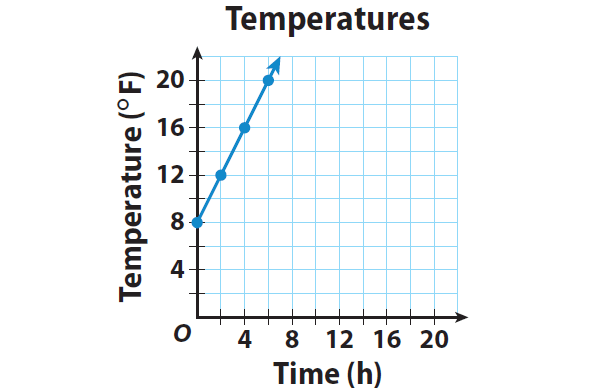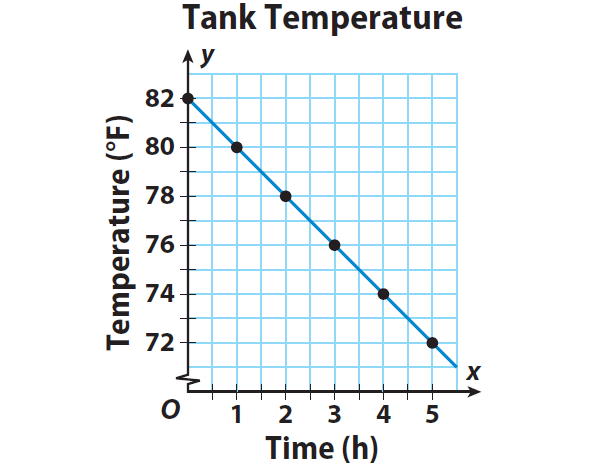GRAPHING LINEAR FUNCTIONS
The table shows the total amount of rain that falls in various amounts of time during a heavy rain.

If 'x' denotes time and 'y' denotes total amount of rain, then the relationship between time and total amount of rain can be represented by the equation
y = 1.5x
The graph of the relationship will be a line, so the equation is a linear equation. Since there is exactly one value of y for each value of x, the relationship is a linear function.
Example 1 :
The temperature at dawn was 8 °F and increased steadily 2 °F every hour. The equation y = 2x + 8 gives the temperature y after x hours. State whether the relationship between the time and the temperature is proportional or non proportional. Then graph the function.
Solution :
Step 1 :
The given equation y = 2x + 8 is in slope-intercept form linear equation. That is, y = mx + b.
When we compare the equation y = 2x + 8 with y = mx + b, we get m = 2 and b = 8.
Therefore, the equation is a linear equation. Since b ≠ 0, the relationship is non proportional.
Step 2 :
Choose several values for the input x. Plug these values for x in the equation to find the output y.
x
0
2
4
6
2x + 8
2(0) + 8
2(2) + 8
2(4) + 8
2(6) + 8
y
8
12
16
20
(x, y)
(0, 8)
(2, 12)
(4, 16)
(6, 20)
Step 3 :
Graph the ordered pairs. Then draw a line through the points to represent the solutions of the function.

Problem 2 :
The temperature of a fish tank was 82 °F and decreased steadily 2 °F every hour. The equation y = -2x + 82 gives the temperature y after x hours. State whether the relationship between the time and the temperature is proportional or non proportional. Then graph the function.
Solution :
Step 1 :
The given equation y = -2x + 82 is in slope-intercept form linear equation. That is, y = mx + b.
When we compare the equation y = -2x + 82 with y = mx + b, we get m = -2 and b = 82.
Therefore, the equation is a linear equation. Since b ≠ 0, the relationship is non proportional.
Step 2 :
Choose several values for the input x. Plug these values for x in the equation to find the output y.
x
0
1
2
3
4
5
-2x + 82
-2(0) + 82
-2(1) + 82
-2(2) + 82
-2(3) + 82
-2(4) + 82
-2(5) + 82
y
82
80
78
76
74
72
(x, y)
(0, 82)
(1, 80)
(2, 78)
(3, 76)
(4, 74)
(5, 72)
Step 3 :
Graph the ordered pairs. Then draw a line through the points to represent the solutions of the function.

Kindly mail your feedback to v4formath@gmail.com
We always appreciate your feedback.
©All rights reserved. onlinemath4all.com
Recent Articles
-
Digital SAT Math Problems and Solutions (Part - 150)
Apr 25, 25 11:46 AM
Digital SAT Math Problems and Solutions (Part - 150) -
AP Calculus AB Problems with Solutions (Part - 19)
Apr 24, 25 11:10 PM
AP Calculus AB Problems with Solutions (Part - 19) -
AP Calculus AB Problems with Solutions (Part - 18)
Apr 24, 25 11:06 PM
AP Calculus AB Problems with Solutions (Part - 18)
